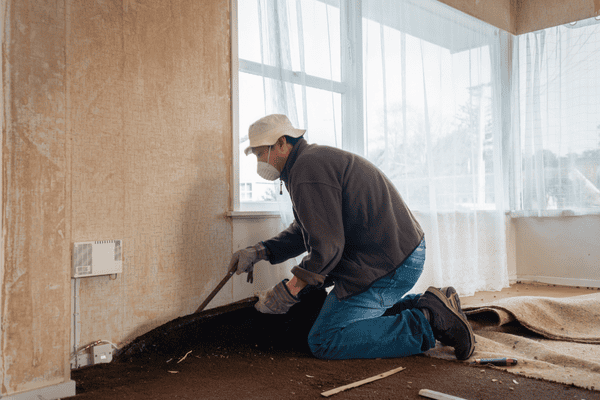Understanding the difference between flood damage and water damage is crucial for homeowners and business owners alike. These terms may seem interchangeable, but in the eyes of insurance providers, they are vastly different. Misinterpreting these terms could result in a denied insurance claim, leaving you with unexpected repair costs.
This article outlines the critical distinctions between flood damage and water damage, how insurance companies handle claims for each, and how to ensure you maximize your claim. If you’re dealing with property damage in San Antonio, Sapphire Restoration is here to help.
What is Flood Damage? Understanding the Insurance Definition
From an insurance perspective, flood damage is not just any water-related damage. According to insurance providers and the Federal Emergency Management Agency (FEMA), flood damage is defined as water covering at least two acres or affecting two or more properties due to external, natural causes.
Common Causes of Flood Damage:
- Hurricanes and tropical storms – Storm surges and excessive rainfall can lead to catastrophic flooding.
- Overflowing rivers, lakes, or reservoirs – Heavy rainfall or dam failures can result in rising water levels.
- Flash floods from heavy rain – Rapid accumulation of water due to intense downpours.
- Tidal waves or storm surges – Coastal properties are at risk of flooding from extreme weather events.
Does Homeowners Insurance Cover Flood Damage?
Most standard homeowners insurance policies do not cover flood damage. To protect your property, you need a separate flood insurance policy, often provided through:
- The National Flood Insurance Program (NFIP)– A federal program designed to provide flood coverage.
- Private insurers – Some companies offer additional flood coverage with different limits and premiums.
Important Tip: If your home is in a flood-prone area, purchasing a flood insurance policy is strongly recommended to avoid paying out of pocket for costly repairs.
What is Water Damage? How It Differs from Flood Damage
Unlike flood damage, water damage results from issues inside your home rather than external forces. Common causes include:
- Burst pipes
- Roof leaks due to heavy rain
- Malfunctioning appliances (washing machines, water heaters, etc.)
- Plumbing overflows
Water damage is generally covered under standard homeowner’s insurance policies, as long as the damage is sudden and accidental. However, long-term issues, such as mold from neglected leaks, may not be covered.
From an insurance standpoint, the key difference between water damage and flood damage lies in the source: water damage originates from inside the home, while flood damage comes from external sources impacting multiple properties.
How Insurance Companies Handle Flood Damage vs. Water Damage Claims
| Feature | Water Damage | Flood Damage |
| Cause | Internal (plumbing, appliances, roof leaks) | External (storm surge, overflowing rivers, flash floods) |
| Source | Inside the home | Outside the home |
| Insurance Coverage | Covered by homeowners insurance (if sudden and accidental) | Requires separate flood insurance |
| Extent of Damage | Typically limited to specific areas | Widespread, affecting multiple homes or properties |
Homeowners Insurance and Water Damage Claims
Most standard homeowners insurance policies cover water damage, but only if the cause is sudden and not due to neglect. If your roof leaks due to a storm, your policy may cover it, but if the roof was already deteriorating, your claim may be denied.
Flood Insurance and Flood Damage Claims
Since flood damage is excluded from homeowners insurance, you will need a flood insurance policy to cover repairs and restoration.
Common Reasons for Insurance Claim Denials
- Unclear cause of damage – If it’s not obvious whether the water damage is from a flood or an internal source, insurance may deny the claim.
- Lack of maintenance – If gradual leaks or roof deterioration caused water damage, insurers might argue it was preventable.
- Waiting too long to report – If homeowners delay reporting damage, insurance providers may refuse coverage due to additional damage that could have been prevented.
Steps to Take After Experiencing Flood or Water Damage
- Stop the source of water if possible (turn off main water supply).
- Document the damage with photos and videos.
- Contact your insurance company to report the damage.
- Hire water damage restoration specialists like Sapphire Restoration for immediate assistance.
Acting quickly can prevent further issues such as mold growth and structural damage.
Tips for Maximizing Your Insurance Claim
- Provide clear documentation of all damages.
- Submit your claim as soon as possible.
- Work with a public adjuster if necessary to assess damages fairly.
- Understand your policy’s coverage limits in advance.
Preventative measures—such as regular maintenance, installing water detection devices, and knowing your insurance coverage—can save you from major financial losses in the future.
Why Choose Sapphire Restoration?
At Sapphire Restoration, we uphold a strong commitment to integrity and service. We are dedicated to helping homeowners and businesses recover from disasters without taking advantage of clients.
Our services include:
- Water Damage Restoration: Rapid response for flooding, leaks, and burst pipes.
- Mold Remediation: Comprehensive mold detection and removal.
- Fire Damage Restoration: Cleaning and restoring properties after fire and smoke damage.
We proudly serve San Antonio and the surrounding areas, including Alamo Heights, Bulverde, Helotes, and Stone Oak.
Conclusion: Be Prepared and Know Your Coverage
Knowing the difference between flood damage and water damage is crucial when filing an insurance claim. Understanding what’s covered and what isn’t can help homeowners avoid financial surprises.
At Sapphire Restoration, we believe in honesty, transparency, and treating every client like family. If you need water damage restoration or flood damage recovery, contact us today for a free estimate.
Don’t wait until disaster strikes—know your insurance coverage and act fast when water damage occurs!

